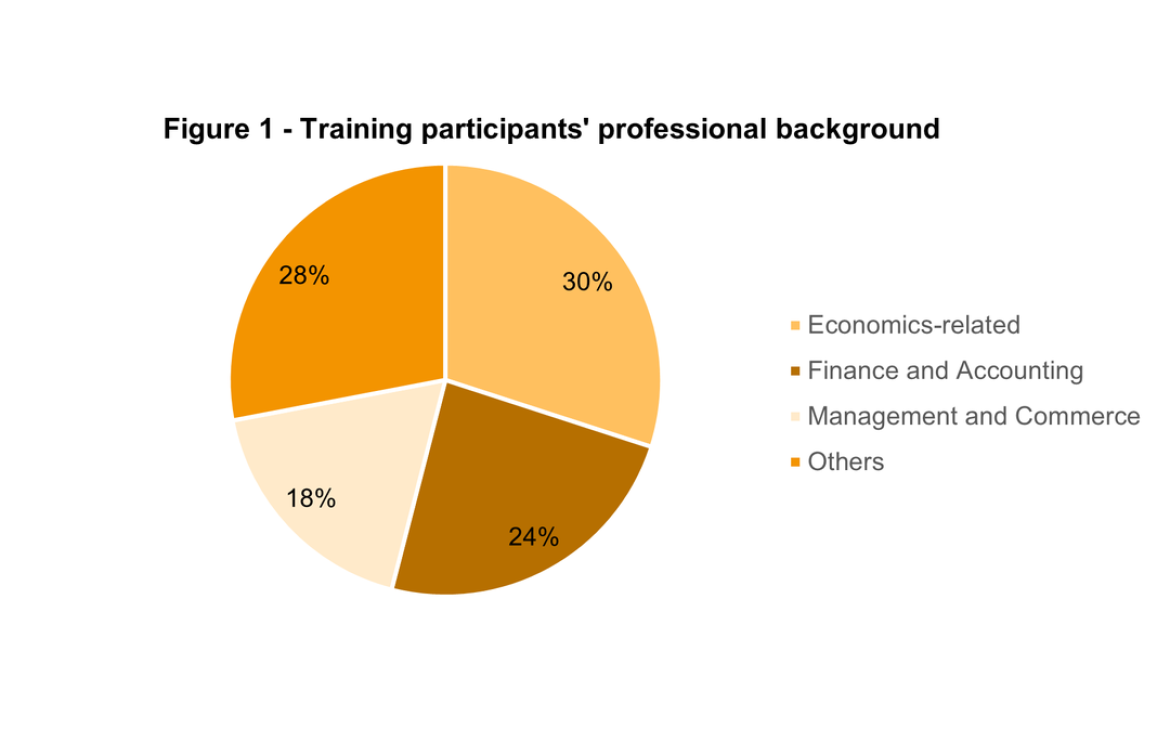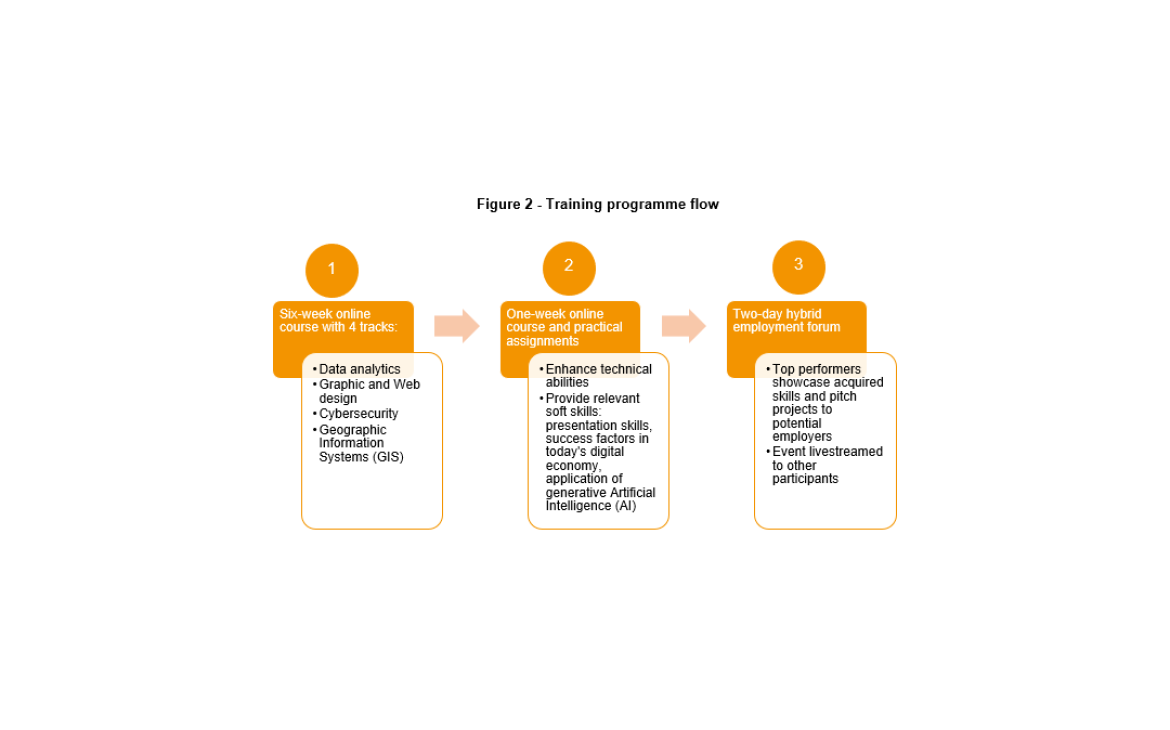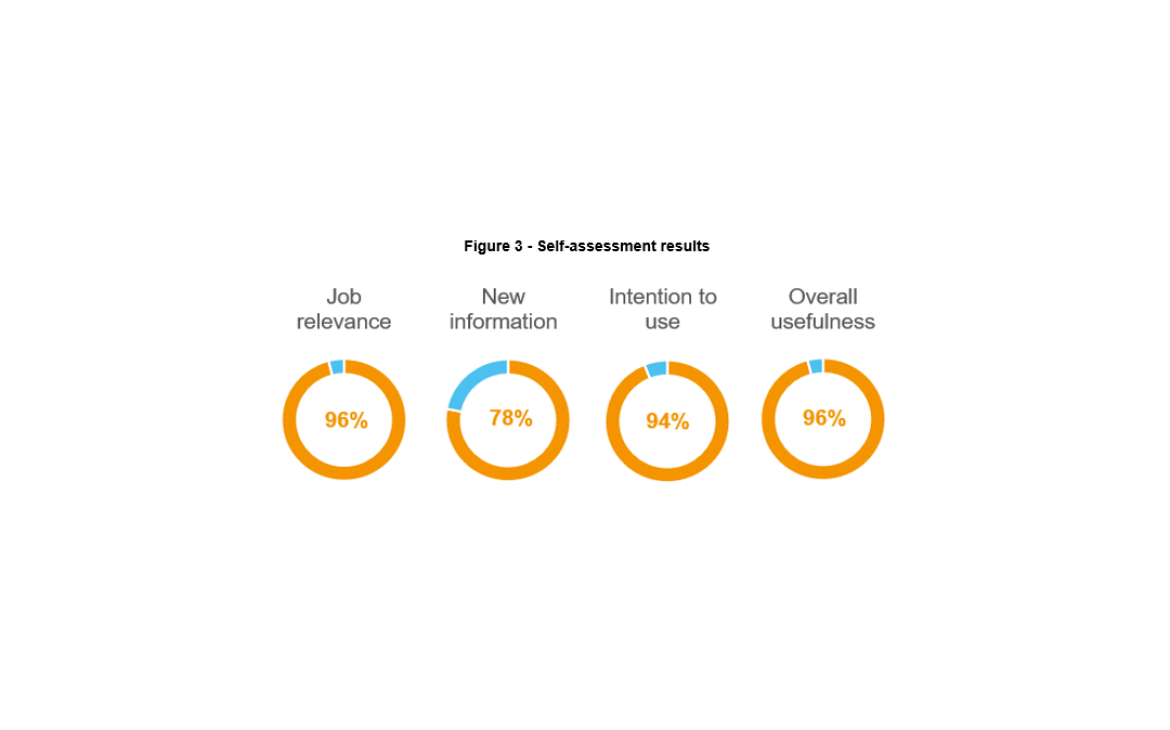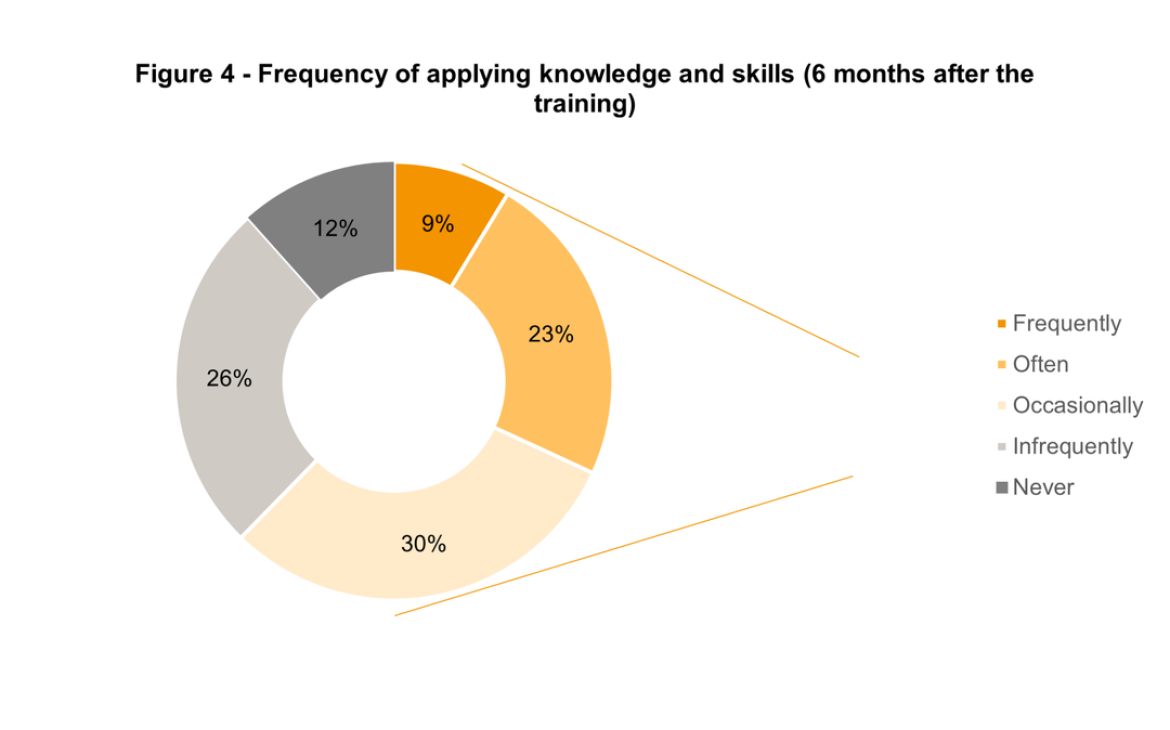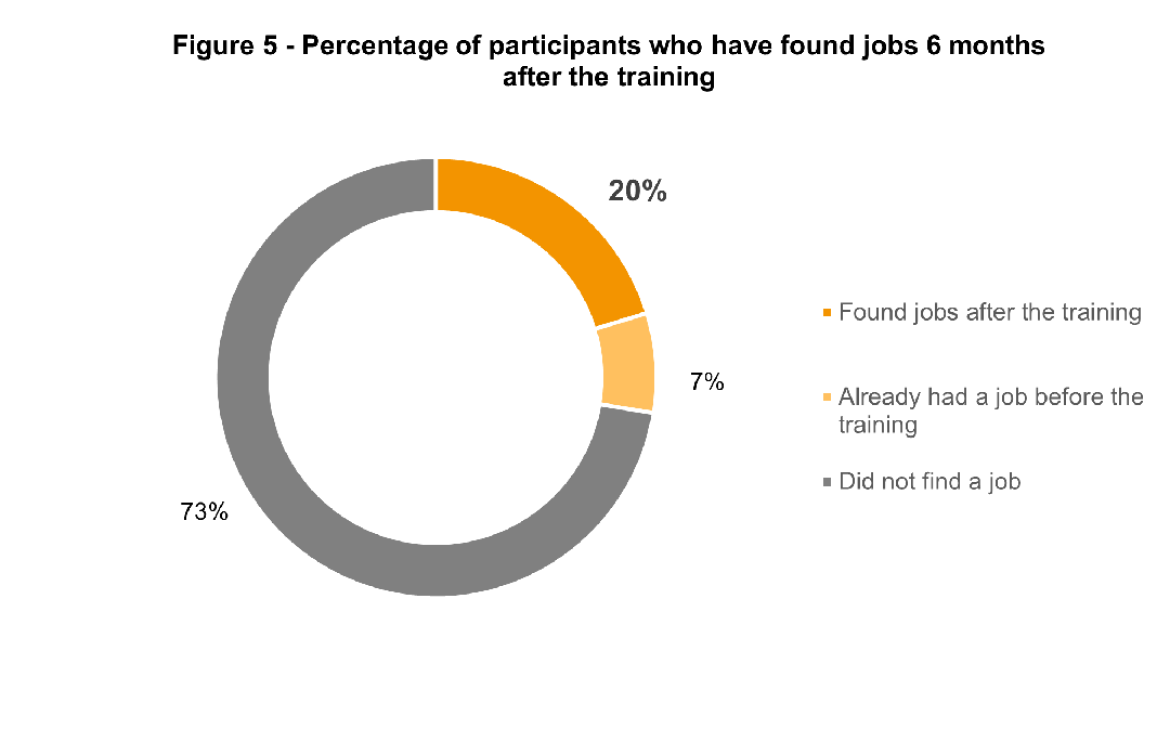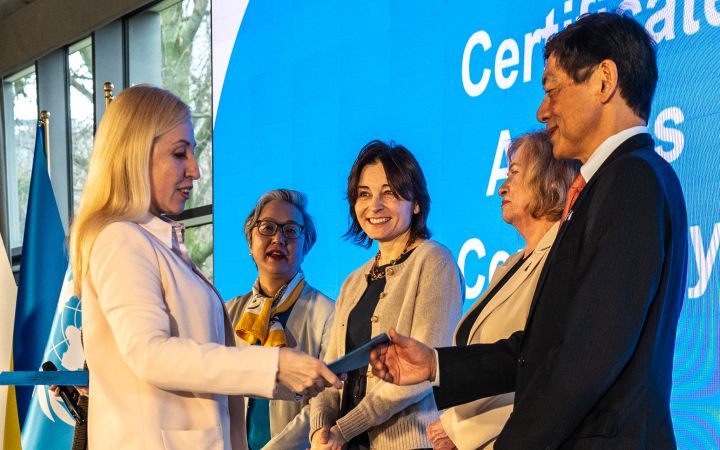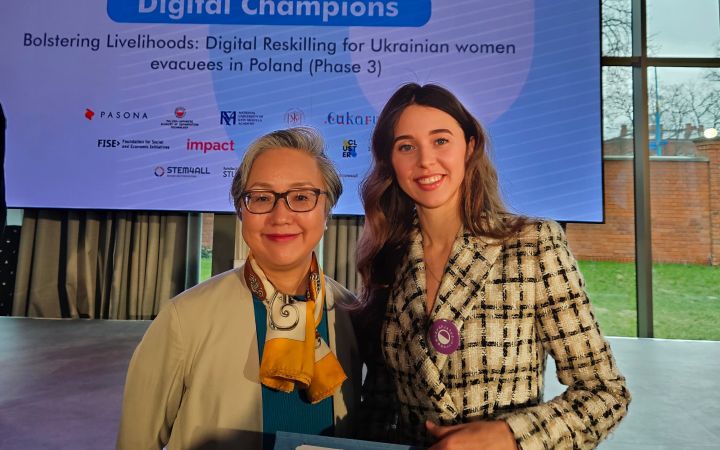Background
Until 08 October 2024, Poland had received 981,335 refugees[1] from Ukraine fleeing the war in the country, most of whom are women and children (UNHCR, 2024a, 2024b). Efforts to assist refugees’ economic integration are underway, including job training and language classes, with support from international and local organizations (UNHCR, 2024b). As part of these efforts, the UNITAR Division for Prosperity, with financial support from the Government and the People of Japan, organized the programme “Emergency assistance for Ukrainian women refugees in Poland with digital 4IR training: Bolstering livelihoods” between October 2023 and March 2024.
The programme targeted Ukrainian women refugees in Poland and aimed at enhancing their employability by providing them the opportunity to acquire new digital skills for the modern job market that either reinforced their previous professional experience to adapt to their new environment or opened ways for exploring new career paths. The programme intended to develop IT and entrepreneurial skills and mindsets to bolster participants’ livelihoods, with emphasis on refugees with more disadvantaged backgrounds.
Five hundred women out of 1,000 applicants were selected to take part in the programme, seventy-five per cent of whom are between 30 and 46 years old. Participants have diverse professional backgrounds as illustrated in Figure 1. It is also worth noting that eighty per cent of them hold a high educational degree including a bachelor’s, master’s and even PhD.
[1] The Ukrainian Embassies in Poland and Japan prefer to use the term “evacuees” instead of “refugees” in specific contexts.
Following a needs assessment and gap analysis, the programme was designed and delivered in three phases including i) a six-week self-paced online course with four tracks based on the applicants’ interests; ii) a one-week online course consisting of a series of webinars and practical assignments that aim to enhance practical technical skills and relevant soft skills; and iii) a two-day hybrid employment forum where 41 programme top-performers showcased their acquired skills and pitched their projects to potential employers in Poland while other participants attended through live stream. The programme flow is illustrated in Figure 2. The training was delivered in Ukrainian, Polish and English to accommodate the diversity of training participants.
Links with the Sustainable Development Goals (SDGs)
The programme was aligned to SDG 4 “Quality education”, SDG 5 “Gender equality”, SDG 8 “Decent work and economic growth”, SDG 10 “Reduced inequalities”, and SDG 16 “Peace, Justice and Strong Institutions”.
Learning outcomes, application of knowledge and skills, and main changes derived from the training
Over 100 participants out of 500 successfully completed the first phase of the programme. Then, the 50 top performers were subsequently selected to advance through the following phases of the programme, of which 50 participated in the second and 41 in the third phase.
Post-training self-assessments at the end of the first and third phases of the programme suggested highly positive reactions from training participants, as illustrated in Figure 3. While 78 per cent of participants consider the information taught during the course as new, 96 per cent found it relevant and useful, and 94 per cent expressed their intention to use the acquired knowledge and skills.
Participants appreciated the training programme for its emphasis on practice with skills and opportunities for hands-on experiences through class assignments and group work, as well as an international perspective from a diverse range of training partners including companies, academic institutions and NGOs from Japan, Poland and Ukraine.
“The programme helped me add very valuable skills. I hope for a good result in finding a job that will be useful to society because Geographic Information System (GIS) is both [...] construction and safety of cities and population.”
They also praised the programme for its relevance to the learners, especially given their current situation of settling in a new country.
“Such a programme is simply invaluable, given the difficulties of adaptation in the conditions of an unplanned move to a new country.”
“This programme is much more than just training - it's about personal development, support, a sense of community, and the opportunity to show by one's own example that the world around us is beautiful and always provides opportunities to overcome the challenges that people face.”
Six months after the training’s completion, the project team applied a survey that captured participants’ application of knowledge and skills from the programme and changes in participants’ professional lives. The survey results show that 62 per cent of learners have frequently, often or occasionally applied the knowledge and skills learned from the training.
Before the training, 75 per cent of participants did not have any experience in the digital economy. They found themselves in low-paying jobs that involved mainly manual labour despite having a higher level of education. Six months after completing the training, 20 per cent have found jobs and the vast majority (95 per cent) of the jobs found are related to the skills provided in the UNITAR training programme.
Incorporating Data Analytics Skills for Improved Performance
Iryna Markina
Director of Sales – Private joint-stock company “USH Insurance Company”
Warsaw, Poland, Iryna is originally from Ukraine and currently living in Poland. With 16 years of experience in sales and management, she is leading a sales department at a Ukrainian insurance company. As someone with a thirst for knowledge, Iryna was looking for professional development opportunities when she came across UNITAR’s Bolstering Livelihoods training programme. Describing her participation in the training at this point in her career as “invigorating”, Iryna has inspired her colleagues by applying the newly acquired digital skills to transform her working approach, which has created concrete business outputs.
“The programme has reshaped how I approach my work. I’ve integrated new tools and techniques into my daily tasks, which has improved my problem-solving abilities. The knowledge I gained has made me more adaptable and better equipped to handle the challenges of today’s business environment.”
The courses on Data Analytics and GIS enabled her to work from a more data-driven perspective, which improved her efficiency and gave her greater confidence in tackling complex problems. In her final project as part of the training, Iryna conducted an analysis of the Ukrainian insurance market and examined the impact of the 2022 military actions. This helped her identify market trends and determine which insurance companies were likely to exit the market due to the challenging economic environment. With such information, she proactively recruited experienced agents from these companies, who brought in new clients, contributing to a 12 per cent revenue growth despite a reduced range of insurance products. This strategic move allowed her company to maintain and even increase business volume in a time of significant market contraction. Client retention also improved because the company was able to provide more customized products based on data-driven insights.
Despite some initial scepticism and resistance to change, concrete improvements in business outputs have inspired Iryna’s supervisors and direct reports to be more data-driven in decision-making. This support, together with the existing infrastructure at the company has allowed Iryna to apply her skills and knowledge to the company’s advantage. However, she also recognized persuading colleagues who are used to traditional decision-making approaches is a process and that gathering data under increasingly difficult geopolitical circumstances can be quite challenging.
Iryna considers that the course has the potential to provide Ukrainian women with key skills in the finance, technology, and insurance industries. As a professional in a senior leadership position, she recommends the programme organize mentoring activities to stimulate exchange between junior and senior professionals.
Data Analysis as a Cross-Cutting Skill in Professional Practice
Natalia
Psychologist
Mikolaiv, Ukraine, Natalia is a Ukrainian psychologist who moved to Poland in June 2022. There, she worked as a career counsellor at a livelihood centre for Ukrainian refugees. In October 2023, Natalia signed up for the first phase of the UNITAR Bolstering Livelihoods training programme, specializing in Data Analytics, to complement the skills required for her job at the time and to look for potential new employment opportunities. While Natalia has now moved back to Ukraine and has her private practice, she was able to integrate the knowledge and skills learned during the programme in her previous job.
While working as a psychologist, Natalia realized the importance of IT skills. In her daily job, her main responsibility was to provide counselling support to clients. However, she also needed to provide management support in terms of entering and analysing data and generating reports. For this, the Excel and statistical analysis skills gained during the programme came in handy. Before attending UNITAR’s training, Natalia had very basic Excel skills and mostly used Excel to work with text. After the training, she knew how to work with numbers using Excel formulas, had a better understanding of statistical principles and was able to generate reports from the available data alongside her leadership. These skills were very valuable in helping her team gather insights on their clients’ demographics and treatment progress, which helped the team to cater to and adjust interventions to meet the specific needs of the clients. Natalia’s newly acquired skills in data analytics also filled an important gap in her team because most of the other psychologists did not have these skills.
In the field of psychology, practice is important but so is research. Psychologists rely on data to make sure their approaches are evidence-based and in turn, through practice and continuous research, contribute to the pool of evidence that informs good practices in the field. Therefore, working with data is a valuable skill for psychologists to work more effectively and to contribute to the growing body of research in their respective fields. For the final project as part of the training, Natalia conducted a small study on the happiness index of the population of Ukraine to understand the different factors that affect Ukrainians' happiness, using secondary data and analysing it with the data analytics skills she acquired during the programme. Natalia believes this has been a good experience to prepare her for future research, that would contribute to her professional growth.
Natalia values the learning from the programme and the advantages it gave her over other team members in her past job. She only wishes the programme would have been longer to have enough time to digest each of the modules covered during the first phase she attended.
Cybersecurity for Effective and Safe Business
Mariia Markina
Chartering broker, Seazam Maritime Ltd
Warsaw, Poland, At the time of joining the programme, Mariia was working in the maritime shipping industry as an Operations Project Manager, coordinating complex logistics processes including searching for suitable shipping carriers, managing and ensuring safe and successful transports of cargoes. She signed up for the Cybersecurity track, as she realized the importance of data security in the shipping industry where a high amount of clients’ information is involved.
Right after the training, Mariia was able to apply her knowledge and skills in cybersecurity directly in her work by implementing stricter cybersecurity protocols for managing data and communications. She initiated the use of two-factor authentication for a project management system, which enhanced secured access to information about cargo, shipping routes, and clients. Mariia also collaborated with the IT department to create regular backups of key data and monitor systems for potential threats. These measures helped prevent operational downtime and increased trust from clients and partners.
Three months ago, Mariia started a new job as a chartering broker, working for a company specializing in ship chartering that organizes international maritime transportation in the Black Sea and the Mediterranean Sea. She continues to apply cybersecurity knowledge in her current role to protect data related to transactions, contracts, and commercial proposals. One example includes implementing secure communication channels for negotiations and document exchange with clients. This is especially critical in an environment where confidentiality and the speed of information transfer directly affect the outcomes of business deals. Additionally, Mariia worked with IT specialists to implement a Client Relationship Management (CRM) system that incorporates modern data protection methods, which helped streamline client management processes and minimized the risk of unauthorized access to commercial information.
Mariia stressed how important it is to get support and commitment across different departments for cybersecurity measures to be implemented effectively. For this, she initiated a cybersecurity training programme for her colleagues where she shared information and showed specific examples of how cybersecurity measures can help the company prevent data leaks and reduce the time needed to eliminate cyberattacks, which have recently become an issue with Ukrainian shipping companies.
Having participated in a few different training programmes, Mariia was particularly impressed with the Bolstering Livelihoods training programme. For future improvement, she suggested the inclusion of a larger pool of companies at the employment forum, more internship opportunities for inexperienced participants and a more rigorous filtering process to make sure participants have equal levels of knowledge at the start of the programme.
Conclusion
The Bolstering Livelihoods Training Programme was impactful in giving Ukrainian women who live in Poland practical IT skills that are in high demand in the Polish and Ukrainian job market. Overall, 96 per cent of participants confirmed the relevance and usefulness of the training programme and 20 per cent found jobs six months after the training. Many participants were able to immediately apply the knowledge and skills they learned during the training to do their jobs more effectively or use the skills to access new employment opportunities.
This programme is a testament to UNITAR’s commitment to the recently adopted Pact for the future[1] as it contributes to ensuring the participation of vulnerable populations and women and girls in technology and the digital economy.
[1] Pact for the Future, Global Digital Compact and Declaration on Future Generations
References
The UN Refugee Agency. (2024). Poland: operation factsheet in Polish language (September 2024). https://data.unhcr.org/en/documents/details/112175
The UN Refugee Agency. (2024). Ukraine refugee situation: Poland.https://data.unhcr.org/en/situations/ukraine/location/10781


